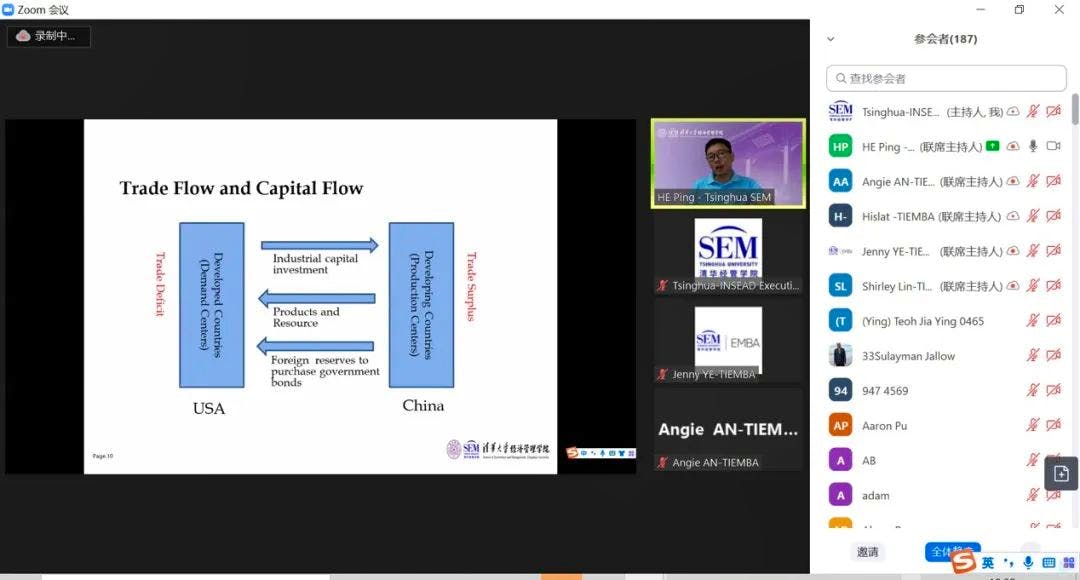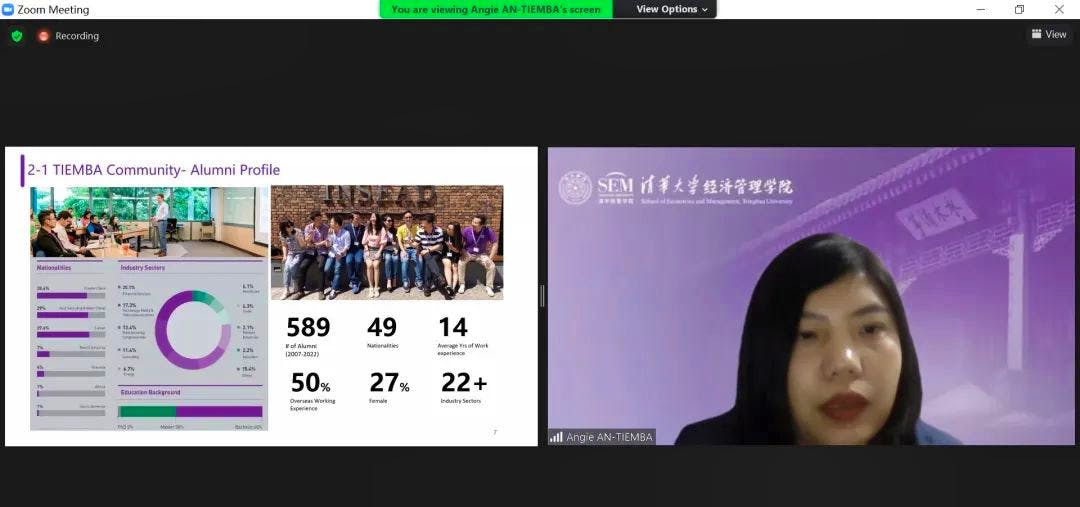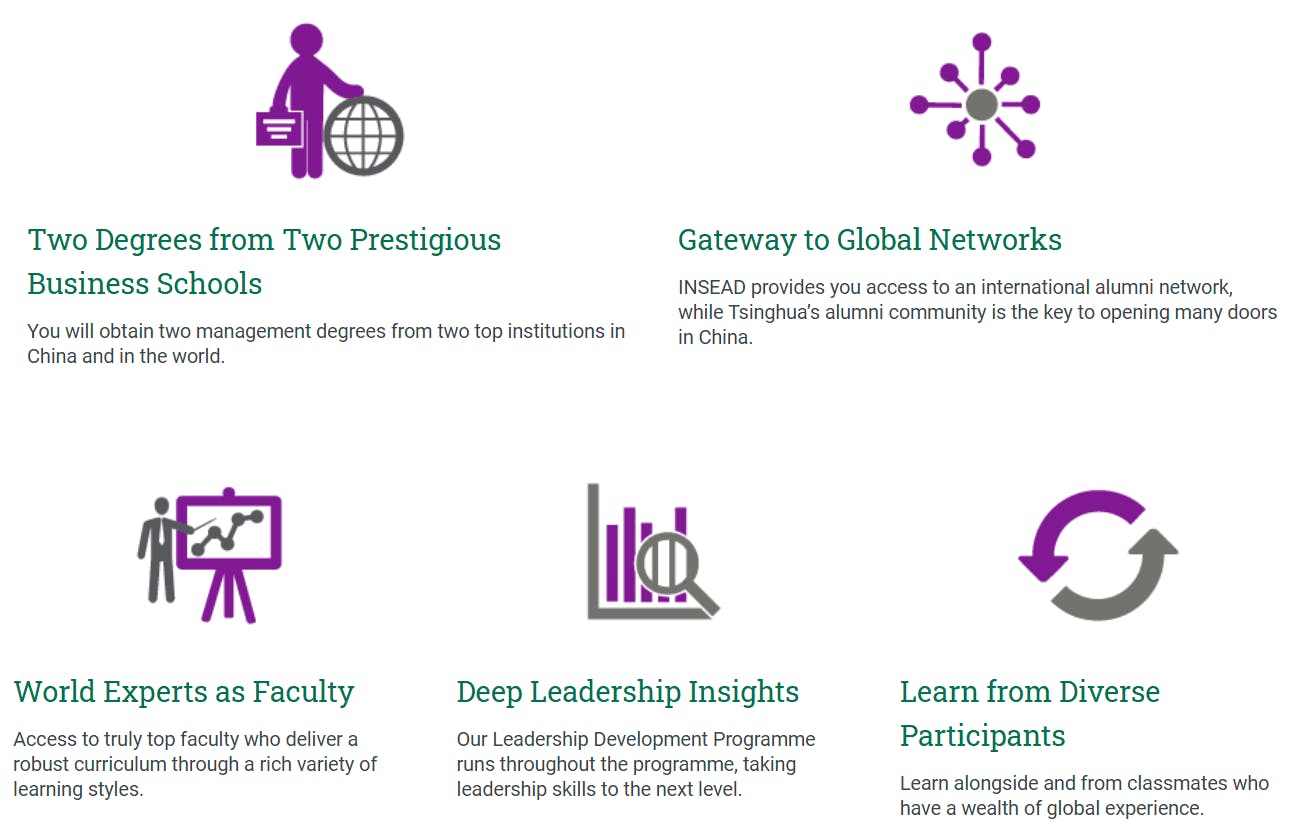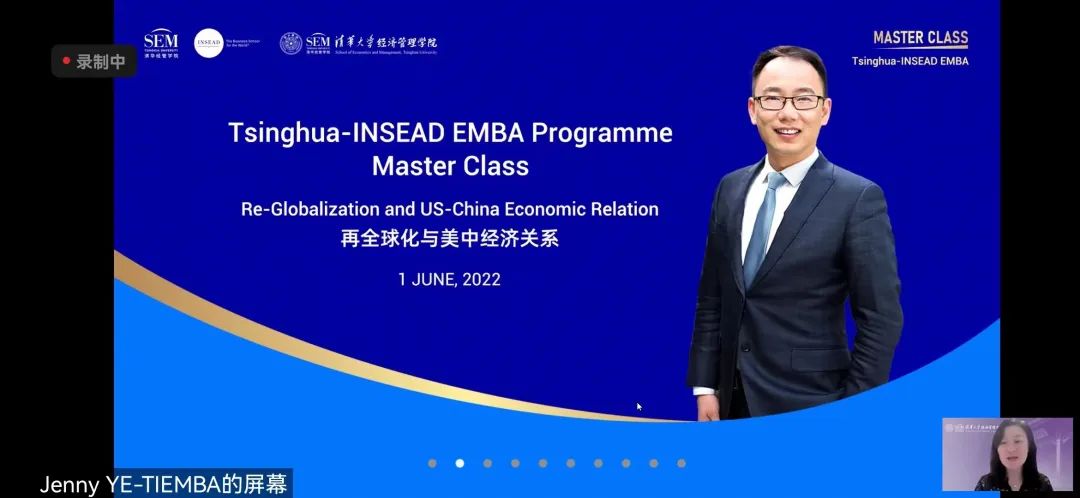What is the future of globalisation?
The event fell into two parts, a lecture themed on Re-Globalization and US-China Economic Relation delivered by Professor HE Ping, who is the Associate Dean of School of Economics and Management; and programme introduction presented by Ms. Angie AN, who is the director of TIEMBA programme.
Lecture Summary: Globalization, Re-Globalization, and US-China
In the lecture, professor He talked about globalization, re-globalization, and the US-China economic relation from a historical and economic perspective. He also discussed the three waves of global industry transfer that happened in 1950s, 1960s-1970s, and in 1980s respectively. Global manufacturing industry flew from the United States and Europe to Japan, then to the four dragons of Asia before flowing into China’s coastal areas. Recent years has seen a flux of global industry into inner lands of China, Vietnam, Cambodia, and other neighboring countries. Crises of GlobalizationWhile some countries have benefitted from globalization, it has brought about problems as well. Subprime crisis and euro crisis, for example, are the direct outcome of globalization. Professor He thinks the existing model of “East Asian production, American consumption” is not sustainable, for US and European markets are not sufficient to sustain the global economic growth. China has a big market, and other developing countries need opportunities as well.Trends of “De-Globalization” are emerging: Population is flowing from poor countries to rich countries due to excessive global income gap and wars, and refugee problems have brought up discussions on closing borders. Moreover, the rise of China has brought pressure to Western countries and triggered trade protectionism and Nationalism. The populist thought in the US insist that America and other developed countries in the West should maintain their leading position in global governance, cultural superiority, and technological leadership, which is unfair. Hence, Re-Globalization is needed as it brings more fairness, ensures more opportunities for developing countries, and makes a more secure supply chain. Professor He then introduced his prospects for China’s growth, where he covered changes in both the internal environment and external environment. It would bring a change to China’s growth mode as well.
Crises of GlobalizationWhile some countries have benefitted from globalization, it has brought about problems as well. Subprime crisis and euro crisis, for example, are the direct outcome of globalization. Professor He thinks the existing model of “East Asian production, American consumption” is not sustainable, for US and European markets are not sufficient to sustain the global economic growth. China has a big market, and other developing countries need opportunities as well.Trends of “De-Globalization” are emerging: Population is flowing from poor countries to rich countries due to excessive global income gap and wars, and refugee problems have brought up discussions on closing borders. Moreover, the rise of China has brought pressure to Western countries and triggered trade protectionism and Nationalism. The populist thought in the US insist that America and other developed countries in the West should maintain their leading position in global governance, cultural superiority, and technological leadership, which is unfair. Hence, Re-Globalization is needed as it brings more fairness, ensures more opportunities for developing countries, and makes a more secure supply chain. Professor He then introduced his prospects for China’s growth, where he covered changes in both the internal environment and external environment. It would bring a change to China’s growth mode as well. Lastly, Professor He talked about implications for US-China relation, noting that it is likely to form a global economic system with a US-centered economic and trade network and a China-centered economic and trade network, which are competing and cooperating with each other.At the end of the lecture, Professor He communicated with attendees in the Q&A session, where he answered questions regarding Belt and Road Initiative, and the impact on the US and EU countries.
Lastly, Professor He talked about implications for US-China relation, noting that it is likely to form a global economic system with a US-centered economic and trade network and a China-centered economic and trade network, which are competing and cooperating with each other.At the end of the lecture, Professor He communicated with attendees in the Q&A session, where he answered questions regarding Belt and Road Initiative, and the impact on the US and EU countries.
About TIEMBA

After the lecture, Ms. Angie gave a detailed presentation about TIEMBA, which is a unique partnership programme between Tsinghua SEM and INSEAD, one of the most prestige EMBA programmes in the world. She announced that the recruitment for TIEMBA 2023 intake has kicked off.

Ranked #3 by the Financial Times in 2018, the Tsinghua – INSEAD Executive MBA (TIEMBA) is a unique partnership between INSEAD, one of the world’s leading business schools, and Tsinghua, one of China’s most prestigious universities. The programme takes place across INSEAD’s three campuses in Singapore, Abu Dhabi and Fontainebleau (France), and Tsinghua’s campus in Beijing.
As a participant, you will exchange perspectives within an elite, dynamic, culturally diverse class of experienced managers and be part of two powerful alumni networks. The TIEMBA is where life-changing leadership development meets the technical mastery of key business disciplines. And both make an immediate impact on your organization. It is the best of East and West, learning and working, technical knowledge and soft skills — in a single programme.

Savannah Billman has a master's degree in Chinese Law and Society at the Yenching Academy of Peking University. She holds a B.A. from NYU Shanghai and has also written for The World of Chinese, TechNode, SupChina, and Sixth Tone.
Latest posts by Savannah Billman
(see all)





